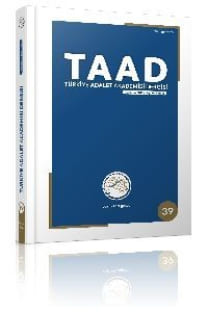GELECEKTEKİ ALACAKLARIN DEVRİNDE “BELİRLİLİK/BELİRLENEBİLİRLİK” ŞARTI VE BUNUN FACTORING-TEMLİKİ İŞLEMİNDEKİ GÖRÜNÜMÜ
Gelecekteki alacakların temliki, Factoring, Factoring Temliki, tasarruf etkisi, belirlilik şartı, belirlenebilirlik şartı, özellililik (şahsilik) ilkesi
The Condition of “Determination/Determinability” in the Transfer of Future Receivables and its Appearance in the Factoring-Association Process
Assignment of future receivables, Factoring, Factoring Assignment, savings effect, certainty condition, determinability condition, characteristic (personality) principle,
___
- Akyol Ş, Borçlar Hukuku Özel Borç İlişkileri I. Fasikül (İstanbul, 1984).
- Bucher E, Schweizerisches Obligationenrecht, Allg.Teil ohne Deliktsrecht( 2. Aufl., Zürich 1988).
- Bucher E, Zur Gültigkeit von Globalzession, Urteilsanmerkung Zivilrecht (BGE 113 II 163, recht 1989).
- Canaris W, Grosskommentar zum Handelsgesetzbuch, Band III/3, Bankvertragsrecht (3. Auflage, 2. Bearbeitung, Berlin/New York 1981).
- Dalcı N, Müstakbel Alacakların Toptan Devri, Prof.Dr.Erdal Onar’a Armağan ( C.I, Ankara 2013).
- Eren F, Borçlar Hukuku Genel Hükümler ( 27.Baskı Ankara 2022).
- Feyzioğlu N, Genel Hükümler (C.II, 2.Baskı İstanbul 1977).
- Gauch P./Schluep W/Jaeggi P, Schweizerisches Obligationenrecht,Allgemeiner Teil, Band II (4. Auflage, Zürich 1987).
- Haenseler P, Die Globalzession, Diss ( Zürich 1991).
- Kleyling T, Zession -unter besonderer Berücksichtigung der Globalzession- und Forderungsverpfaendung als Mittel zur Sicherung von Krediten ( Zürich, 1980).
- Kocaman A, Alacağın Temlikinin Benzer Üçlü İlişkiler Karşısındaki Teorik Sınırı Sorunu (Ankara 1989).
- Kocaman A, Factoring İşleminin Hukuki Niteliği, Banka ve Ticaret Hukuku Araştırma Enstitüsü Yayını, (Ankara 1992).
- Larenz K, Lehrbuch des Schuldrechts, Bd.I, Allgemeiner Teil (13. Auflage, München 1982).
- Lempenau G, Direkterwerb oder Durchgangserwerb bei Übertragung künftiger Rechte, (Berlin/Zürich, 1968).
- Lunckenbein H. G, Rechtsprobleme des Factoring-Vertrages, Diss (München, 1983).
- Martinek M, Moderne Vertragstypen, Bd.I : Leasing und Factoring( München 1991).
- Nörr K.W/Scheyhing R./Pöggeler W., Sukzession, Forderungszession-Vertragsübernahme-Schuldübernahme (2.Aufl. Tübingen 1998).
- Oğuzman K/Öz T, Borçlar Hukuku Genel Hükümler (C.2, 17.B., İstanbul 2022).
- Özakman C, Factoring Sözleşmeleri (İstanbul, 1989).
- Sirmen L, Alacak Rehni ( Ankara, 1990) .
- Tekinay S /Akman S./Burcuoğlu H /Altop A, Borçlar Hukuku Genel Hükümler (7.Baskı İstanbul 1993).
- v.Thannhausen M, Das Inland-Factoring, Vertragliche Gestaltung, Rechtsnatur und Kollision mit dem Verlaengerten Eigentumsvobehalt, Diss (Würzburg 1984).
- v.Tuhr A, Borçlar Hukuku Genel Hükümler (C.I-II, çeviren Cevat Edege, Ankara 1983).
- v. Tuhr A /Escher A, Allg.Teil des Schweizerischen Obligationenrechts, Bd.II, 3. Auflage, Zürich 1974.
- v.Tuhr A, Verfügung über künftige Forderungen ( DJZ 1904).
- Westermann W, Interessenkollision und ihre richterliche Wertung beiden Sicherungsrechten an Fahrnis und Forderungen ( Kalsruhe 1954).
- Wolfgang W, Kreditsicherung und Rechtsdogmatik, Berner Festgabe zum Schweizerischen Juristentag (1979).
- Wiegand/Koller T, Gültigkeit der Globalzession einer künftigen Forderung (BGE 113 II 163 vd.) (recht 1988/3).
- Zobl D, Die Globalzession (SJZ 1989).
- ISSN: 1309-6826
- Yayın Aralığı: 4
- Başlangıç: 2010
- Yayıncı: Türkiye Adalet Akademisi
2012 ve 2014 MISIR ANAYASALARININ KARŞILAŞTIRILMASI
ÜST VE EŞYA ARAMASINA İLİŞKİN DÜZENLEMELERİN ANAYASA’YA UYGUNLUĞU
MEDENİ YARGILAMA HUKUKUNDA ELEKTRONİK DURUŞMALARDA ALENİYETİN SAĞLANMASI
KONUTUN DEPREM NEDENİYLE ZARAR GÖRMESİNİN KİRA SÖZLEŞMESİNE ETKİSİ
Şahap KAYMAK, Kamil Ufuk BİLGİN
ÇOCUKLARIN SUÇA İTİLMESİ VE COVİD-19 PANDEMİSİ ÜZERİNE BİR İNCELEME: SİLİVRİ ÖRNEĞİ
Aylin YALÇIN SARIBEY, Ayşe DEĞİRMENCİ
SINIR DIŞI ETME İŞLEMİ ve AİLE YAŞAMINA SAYGI HAKKI: ÇATIŞAN MENFAATLER ve ESAS ALINAN ÖLÇÜTLER
